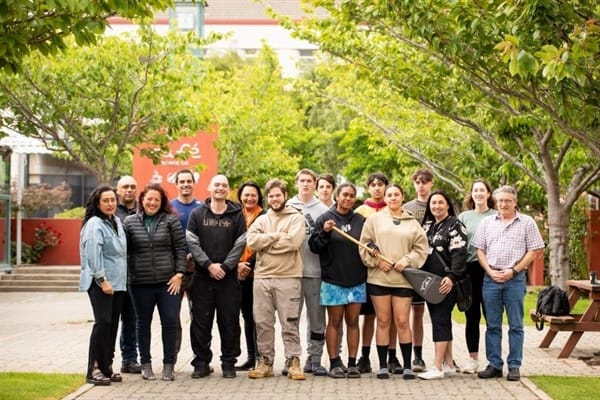
A waka ama pilot project trialled through SIT this year is targeting the wellbeing of Māori and Pasifika construction ākonga | students.
The opportunity to gain funding for the four-week pilot project came through Te Whatu Ora via Te Pūkenga, under the national fund of Kaupapa Māori Wananga. Jodi Conway, SIT Student Services Team Leader, said when the funding opportunity was presented, SIT was able to secure it for He Toki construction scholarship ākonga.
Ten Māori and Pasifika ākonga, who have spent the year studying the SIT New Zealand Certificate in Construction Level 3, while building the Waituna Lagoon education centre, were selected for the waka ama wellbeing pilot.
“[The funding] enabled us to collaborate locally with the Te Ara A Kewa Waka Ama Trust who facilitated the project,” Ms Conway said. Taking an holistic approach to target ākonga mental health and wellbeing, the Trust developed a four-week programme of wananga | learning, to focus on skills such as communication, safety, whanaungatanga | kinship, and working as a team.
Ms Conway described these as key skills, “to enable ākonga to learn techniques that will help them across any challenges which can affect their wellbeing.” She explained the waka ama initiative is a way of applying te ao māori |māori worldview. “Waka ama is embedded in matauranga Māori | Māori knowledge.”
The Culture of Waka Ama Booklet defines waka ama as “not just a sport but also a vehicle for identity, pride and community”, due to its history with Māori and Pasifika people, who formed its traditions over time. The sport is growing, with over 5,000 registered paddlers, many of whom compete nationally and internationally. The National Sprints competitions were recognised by Sport New Zealand when Waka Ama New Zealand received the Event Excellence Award at the Sport New Zealand 2019 Annual Awards.
Academic Leader for the Trades and Technology Faculty, Russell Finlay, said that when the He Toki construction programme was planned, the Faculty wanted to apply a holistic wellbeing approach to help ensure the best possible outcomes for ākonga in gaining their qualification and realising personal growth.
“Waka ama is one of our new initiatives that has added real value to the team and each individual. It brought ākonga closer to nature, giving them a new appreciation of the awa and whenua, and they worked for and relied on each other, taking on this new challenge together.”
Student evaluations of the Waka Ama pilot were positive with all ten ākonga recommending that it be implemented into the next course for ākonga in the future, and many favourable comments from ākonga on the value of the pilot through team building, being out on the water with nature, and improvement in their health and wellbeing.
